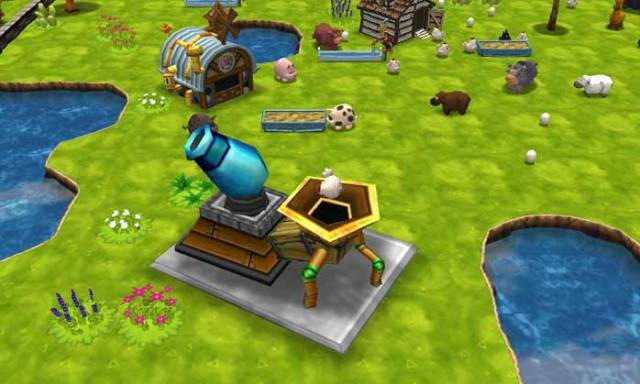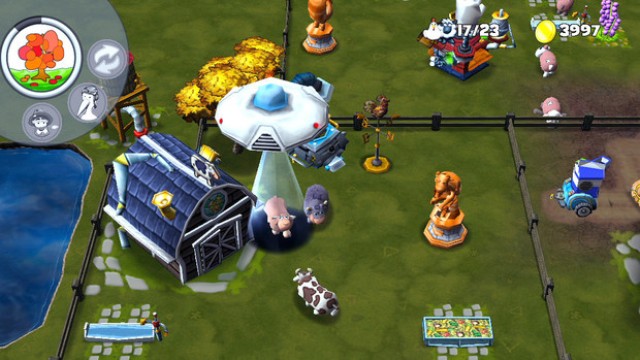Funky Barn Review
 Game: Funky Barn
Game: Funky Barn
Developer: Tantalus
Publisher: 505 Games
Available on: Wii U only
The term “farming simulator” is usually enough to make most dedicated gamers cringe, and in some cases, it’ll provoke an outright slap to your face. While Funky Barn does little to even attempt to lift that stigma, it does manage to be mostly inoffensive at the same time. An update of the 3DS game of the same name (ok, minus “3D”), it’s squarely aimed at the casual crowd.
It’s not unfair to say that Funky Barn is one of the closest things to “shovel-ware” in the Wii U’s launch line-up, but that isn’t to say it is shovel-ware. It’s simply a very casual game, and not the kind of title that the average Call of Duty or Uncharted fan is going to look at. But then, this is a Nintendo game and, as such, will appeal to a fairly decent percentage of their target audience.

The story behind Funky Barn, in so far as there is one, is that you have inherited a ton of farmland from your eccentric uncle, along with blueprints for a bunch of crazy inventions like a robotic egg collector, automated sheep-sheerer and tornado-predictor. Your goal is to raise animals, sell produce, reach the maximum farm level, and (presumably) retire happily. So, you begin with empty land which you can name – I called mine Lillyhole, but I don’t know why – consisting of grass, mud and a handful of watering holes. You’ll also have a device that launches produce you put into it out of a cannon, in exchange for money. It makes little sense, but is undoubtedly funky.
There will also be a chicken. Well, a hen. You can name her, too, and mine was called Clint. Not a pretty name, but fitting. Certainly a better name for a chicken than, say, Drumstick. Anyway, the chicken will produce eggs, providing she is kept happy and not dead, and those eggs can be chucked in the produce cannon thingamajig and sold. This is the premise of Funky Barn, and one that remains largely unblemished throughout. Things do get trickier, mind, as more and more animals become available for delivery by cliché (sorry, stalk), but the central conceit never changes.
There are 8 animal types to farm, including chickens, sheep, cows and pigs, and loads of different gizmos to make your life easier. You can also build fences to keep your beasts segregated, roads for your machinery to travel, and drop natty farm decorations like wagon wheels around the place.

To mix things up, natural disasters will occasionally strike, becoming more frequent as the game progresses. Tornadoes are a real pain, as are foxes that sneak in during the night and devour your chickens. Poor Clint. Alternatively, you can also lose animals through the age-old mediums of neglect and slovenliness. Fail to keep your troughs filled with food and water or your animals happy and they’ll die fairly quickly. Keeping them happy depends on the individual creature; some want to be stroked, some want more trees and greenery in their enclosure, some want more space or companionship. You can interact with each one to see what they need, and it’s worth doing if you want to succeed. Now and then a coloured mushroom will pop up, and its best to identify them quickly so you can pluck out the bad ones. Your animals will eat them straight away, and some of the side effects are detrimental to your creature’s health.
So, the problem with Funky Barn is that it’s not much of a game, and even beside the party-ware like Nintendo Land (which is mostly great), it doesn’t really stand out. The central challenge is too straightforward, the preventative measures against disasters too easy to unlock and purchase; hell, even the produce collection can mostly be handled bereft of your meddling with the right machines. I never felt challenged either as a gamer or an adult, which is fine really, as Funky Barn is clearly aimed at the young/casual/family market anyway, and in fact my 4-year-old daughter found a lot of it to be very entertaining, at one point reaching ER-levels of stress and excitement when one of my sheep, Agamemnon, got a big red exclamation mark over its back because it wanted a tree to stand under.
On the plus side, Funky Barn is very easy to control; although you could perform 80% of tasks without the GamePad, you’ll find yourself using the touchscreen more than the buttons for buying items and interacting with the animals as it just feels more natural. Also, the game looks nice. Not amazing, just… nice. The cartoonish graphics would look more at home in a mobile game, admittedly, but Funky Barn doesn’t embarrass itself.
VERDICT: Funky Barn is not a terrible game. It certainly isn’t shovel-ware; not quite. It’s simply a casual game, which is something Nintendo are well known for, something necessary for Nintendo to release onto the Wii U alongside the likes of ZombiU, FIFA’13 and Assassin’s Creed 3, because there are still Nintendo fans out there who will only buy and play games like Funky Barn. It’s not complex, it’s a little bit too easy, it’s very short (even padded out with optional pop-up challenges) and the audio leaves a lot to be desired, but it’s not a terrible game. As a launch title, however, it fails, because it shows off nothing the Wii U is capable of. You get the feeling the whole thing could be played on a mobile without a visible downside.
Still, if you belong to that casual crowd, or if you fancy yourself a bit of a Farmville champ or you just want something to entertain the kids, you could do a lot worse than Funky Barn. Maybe not on the Wii U, I admit, but it’s early days yet.






